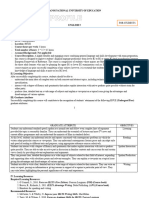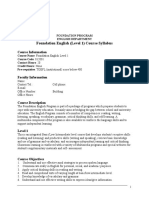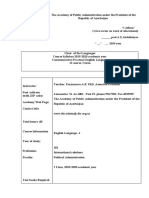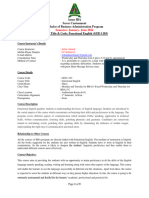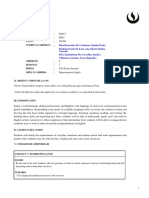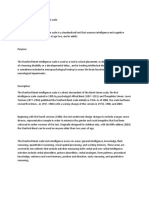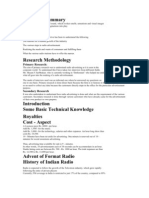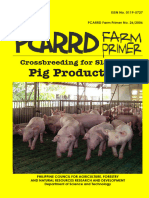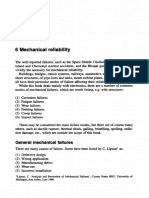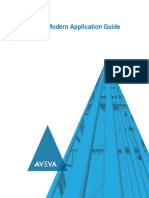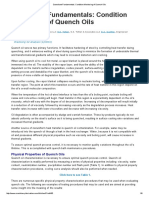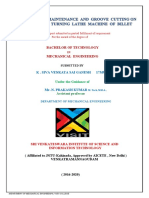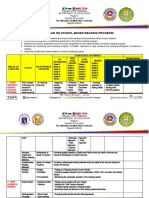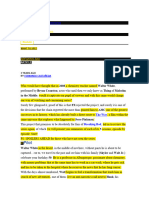English A and B
0500
ACADEMIC YEAR 2025-2026
FALL SEMESTER, 2025
COURSE SYLLABUS
1. COURSE INFORMATION
Classes held:
Total Marks: 100
2. FACULTY INFORMATION
Faculty Name: Tahmina Akter Mili
Email: tahmina.mili@auw.edu.bd
Office Location: H618
Office Hours:
3. COURSE OBJECTIVES AND DESCRIPTION
This course is an intermediate English language class in the General Studies Program at
AUW. Students who test into this level can join this course. The goal is to help students
build a strong foundation in English and improve their speaking, listening, and writing skills.
The course will also introduce important grammar and vocabulary. The teacher will look at
the needs of the students and change the materials if needed. Students will learn through
activities like movement and creative storytelling to improve their listening and
understanding of different types of spoken English. They will also learn how to organise
their writing and find their writing voice. This will help them become ready for the reading
and writing programme.
Course Objectives: At the end of the course students will be able to:
● Be familiar with using perfect and perfect continuous tenses, and formulating options
and descriptive sentences with more fluency.
● Improve their written and spoken English language fluency, and familiarity with
different grammatical forms and their uses, especially phrasal verbs, prepositions, use
of adjectives and adverbs, conditionals, voice changes, and speech (narration
transformation).
● Gain more mastery in consistent subject-verb agreement along with
modals of deduction and probability, and recognition, reading analysis
1
� and gain writing skills with exact structures, paragraph building and
initial recognition of essay organization structure.
● Pronounce words and word structure with more accuracy, gain familiarity with
proper sentence structure, and building new words, with suffixes and prefixes, idioms
and proverbs.
● Practice and improve their written language skills along with specific reading skills to
infer the complex academic reading in the Pre-UG level four and UG programme. They
will be able to identify the simple, complex and compound sentences, and especially
the use of conjunctions and linking words.
COURSE MATERIAL:
1. Headway Intermediate (5th Edition) / Student Book and Workbook
2. Supplementary Book for Book Report + Circle Reading, discussion, NCTB English
for Today 9 and 10 and Writing Practice – “To Kill a Mocking Bird” by Harper Lee
to develop their vocabulary, and critical thinking skills along with analytical power.
4. LEARNING OUTCOMES
● Develop Critical Thinking, Questioning, Interpreting, Describing, Synthesising , Analysing,
Evaluating and Applying Information
● Able to lead discussion, pose critical questions by collaborating with peers
● Organise ideas logically and able to express them concisely by reading texts and research
● Imparting basic knowledge on healthy body and mind and its problems
● Developing an attitude to focus on healthy eating and w o m e n ’ s health and impact of new
age science
● Creating awareness about women reproductive health
● Able to express theory, facts, and beliefs through writing and oral presentation
● To become a more effective and informed citizen that can thoughtfully and actively participate in
conversations, evaluate media reports, and make political decisions related to biology/science and
individual health.
5. ATTENDANCE REQUIREMENT & GRADING POLICY
A 4.0 (93-100) A- 3.7 (90.00-93)
B+ 3.3 (86-89) B 3.0 (83-86) B- 2.7 (80-83)
C+ 2.3 (76-79) C 2.0 (73-76) C- 1.7 (70-73)
D+ 1.3 (66-69) D 1.0 (63-66) D- 0.7 (60-63)
F 0 (59 or below)
2
� Students are required to attend class regularly and meet all requirements for active participation
(completing assigned homework before class, participating in Zoom meetings, engaging in group work, etc.)
If a student misses a class for any reason, it is her responsibility to notify her instructor and provide an
explanation, in advance if possible.
Absences for the following reasons will be considered “excused”. Please note that all excused absences
require proper documentation, e.g. a doctor’s note for medical issues.
3. Death in the immediate family (parent or siblings), for up to one week.
4. Hospitalization or serious impairment due to physical or mental illness, disability, or other medical
problem, for up to two weeks.
a. For longer illnesses, a medical leave for the term may be granted, the procedures for which
can be found in the Academic Bulletin.
5. Unavoidable family responsibilities, e.g. caring for an infant or elderly relative, due to the
hospitalization of an immediate family member, for up to one week.
6. Attending an AUW-sponsored event or representing AUW at a meeting or event, for up to one week.
7. Occasional inability to attend online classes due to mandatory quarantine periods, loss/damage of
your computer or phone, lack of internet access, etc.
a. Students who are consistently unable to attend online classes should apply for a Voluntary
Leave of Absence as described in point 2 or above.
Other absences will be deemed excused or unexcused at the discretion of the instructor. If a student and an
instructor disagree regarding the legitimacy of an excused absence, the Director will intervene, mediate, and
reach a final decision. As a general rule, if circumstances cause a student to be unable to attend or
effectively participate in class for reasons outside of her control, her absences will be excused.
6. CONTACT WITH YOUR INSTRUCTOR
Email (tahmina.mili@auw.edu.bd) is the most convenient and preferred method for communication. Apart
from that, students should write up an email to make an appointment to meet the instructor during the
office hours as well as there will be compulsory meetings to discuss students' assessments and progress
plans. Moreover, in case of urgency, students can book an advance appointment outside of the office hours
too.
While writing an email, please make sure to mention your group name in the subject area, to avoid any kind
of confusion. All the students are requested to check email regularly so as not to miss any important
announcements about the course.
7. COURSE SCHEDULE
Week Topics
Grammar: Information questions - describing people, places, and things.
Week 1 Vocabulary: Adjectives - adjectives and nouns, compound adjectives, -ed and –ing adjectives,
and adjectives for describing personality).
(Unit 1) Speaking: Adding emphasis and intonation.
Writing: Descriptive - facts and opinions.
Week 2 Grammar: Tenses and auxiliary verbs - active and passive voice, questions and negatives,
auxiliary verb practice, short answers.
3
� Vocabulary: Word formation - parts of speech, collocations, nationalities.
(Unit 2) Speaking: Polite language.
Writing: Informal emails.
Grammar: State and activity verbs - questions and answers, simple and continuous tenses, active
Week 3 and passive voice.
Vocabulary: Balancing work and life - leisure activities, jobs, and salaries.
(Unit 3) Speaking: Making small talk and making conversation.
Writing: Job application.
Grammar: Narrative tenses - past tenses, active and passive voice.
Week 4
Vocabulary: Spelling and pronunciation - homophones, reciting a poem, and fairy tales.
Speaking: Giving opinions, agreeing and disagreeing.
(Unit 4)
Writing: Linking ideas.
Grammar: Modals and related verbs - modals for advice, permission, and obligation. Rules and
Week 5 customs - modals in the past and present.
Vocabulary: Phrasal verbs - literal, idiomatic, separable, or inseparable?
(Unit 5) Speaking: Have got to, polite requests, and offers.
Writing: Writing for talking - using sequences in instructions.
Grammar: Present perfect - simple, continuous, and passive tense, and time expressions.
Week 6
Vocabulary: Adverbs - verbs and adverbs that go together, adverbs without -ly, interviews.
Speaking: Have you ever…? How long…? Numbers.
(Unit 6)
Writing: Life changes - using adverbs in descriptive writing.
Grammar: Verb patterns - verb+-ing, verb+infinitive, adjective and prepositions.
Week 7 Vocabulary: Body language - idioms using parts of the body, friendship.
Speaking: The reduced infinitive, exclamations.
(Unit Writing: Discursive writing - arguing for and against, with pros and cons.
7)
Midterm
Grammar: Future forms - future (will, going to, and present continuous), future possibility (may,
Week 8 might, and could).
Vocabulary: Word building - prefixes, suffixes, and changing word stress.
(Unit 8) Speaking: Using ‘pretty’, making arrangements, and roleplay.
Writing: Writing for talking (2) - analysing a talk.
Grammar: Conditionals - second and third conditionals, using might have/ could have/ should
Week 9 have.
Vocabulary: Words with similar meanings - synonyms and antonyms.
(Unit 9) Speaking: Using ‘just’ and talking about money.
Writing: Describing a place - relative pronouns and participles.
Week Grammar: Modals of probability - must be/ can’t be/ looks like, and must have been/ can’t have
10 been.
Vocabulary: Phrasal verbs (2) - phrasal verbs with ‘out’ and ‘up’.
(Unit Speaking: ‘What on Earth…?’ and expressing attitude.
10) Writing: A story - organising a text.
Week Grammar: Noun phrases - articles, possessives, all/ everything, pronouns, and reflexive
11 pronouns.
Vocabulary: Compound nouns - word stress in compound nouns.
(Unit Speaking: Using ‘also’, ‘as well’, ‘too’, and expressing needs.
11) Writing: Informal language in writing.
Week Grammar: Reported speech - reported statements, questions, commands, requests, and indirect
12 questions.
Vocabulary: Ways of speaking - reporting verbs and verbs + prepositions.
4
�(Unit Speaking: Asking questions politely and talking in clichés.
12) Writing: A biography combining sentences.
Week Review Week
13
Week Final exam week
14
8. KEY ASSESSMENTS
Quizzes* 20%
Attendance 5%
Class Participation 15%
Midterm 30%
Final 30%
Total 100%
*Quizzes will be taken after completing each 2 units.
9. PLAGIARISM & ACADEMIC INTEGRITY
All members of the AUW Community are bound by the Academic Honor Code published in the Academic
Bulletin (https://asian-university.org/academic-programs/academic-calendar-bulletin/).
The integrity of students’ academic work is very important to AUW faculty. Universities are based upon the
fundamental principle that the work presented truly belongs to the author, because the academic
community revolves around ideas and creativity. Each person’s ideas are his or her contribution to the
academic community. Therefore, taking another person’s ideas and representing them as one’s own is a
serious form of dishonesty. Similarly, cheating (copying someone else’s work, asking for answers, sharing
answers, etc.) and other forms of dishonesty (falsifying data, making up references, etc.) are also serious
breaches of this honor code.
Plagiarism is intentionally or unintentionally taking credit for another words or ideas. You may not plagiarize
in your academic work, and you must adhere to the following:
● When you use someone else’s words (whether they are from a distinguished author or a classmate’s
paper), place the words you have copied in quotation marks and provide the appropriate citation of
author and source. A good guideline to use to avoid plagiarism is to make sure quotes of three or
more sequential words from someone else are put into quotation marks.
● If you paraphrase (reword) another person’s ideas, then you must also cite the source. Paraphrasing
must involve changing the words and sentence structure of the original source.
● Cite materials you copy or paraphrase from the Internet, even if the author is not identified.
The various academic disciplines (humanities, social sciences, sciences) use slightly different formats for
footnotes, endnotes, and bibliographies. Your professor for a particular class will tell you which format he or
she wants you to use in that class.
5
�Copying, asking for answers, sharing answers, and any other form of cheating (misrepresenting your own
work and knowledge) on exams or quizzes are all forms of academic dishonesty.
Other Forms of Academic Dishonesty
1. Making up references, quoting wrong sources, etc.
2. Falsifying data.
3. Misrepresenting your situation to be excused from academic work.
4. Submitting the same paper in more than one class.
5. Informing a student in a later class about questions on tests or quizzes.
6. Misrepresenting your academic work or qualifications in any way.
10. STRATEGIES TO PREVENT PLAGIARISM & VIOLATIONS OF ACADEMIC INTEGRITY
● If a student is suspected to have breached AUW’s standards of academic honesty, the faculty will
first point it out to the student concerned.
● In case of plagiarism and inappropriate citation, the student will be asked to incorporate appropriate
citation in the works cited page and re-submit the assignment.
● If a student is found to have copied from another student’s work, the assignment will not be graded,
and the student will be asked to redo the work once again.
● If this is repeated in more than 3 cases, grade penalties would be imposed. The work may not be
assessed for the semester and the student may be awarded an ‘F’ grade for the same.
● Repeated instances of academic dishonesty will be brought to the notice of the Director. The matter
will be investigated upon, the concerned student will be informed, and a chance will be given to
him/ her to reply to the accusations.
● The Director, in consultation with the Academic Actions Committee, will decide on the outcome of
the case.
11. CLASS BEHAVIOR
The main motto of the course is to learn and enjoy some valuable time with your peers. All the students are
expected to respect each other despite different cultures, ethnicity, and religions. Remember, I have zero
tolerance for any misbehavior and disrespectful activities or verbal abuse to other classmates.
Some general guidelines inside the class to follow are as below:
● Be on time in the class, in case of 10 minute late you will be considered absent for the class
● Actively participate in the class; for any confusion or question always ask your teacher
●Always raise your hand when you have any questions or have to share your ideas; then wait until your
teachers ask you to response
● Wait for your turn when your peers are talking
● Treat others with the same level of respect and courtesy you would wish them to show to you
●Don’t censor yourself or just write/say what you think other people want to hear. Find your own voice
and speak with it wholeheartedly
●Don’t talk in class when the teacher is present or discussing something, and refrain yourself from using
cell phone at the class without teacher’s permission




